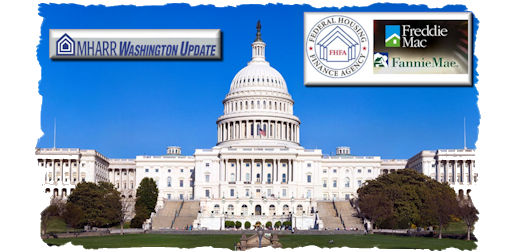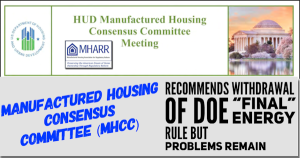At the invitation of the Federal Housing Finance Agency (FHFA), an MHARR delegation attended and participated in an April 26, 2017 meeting in Washington, D.C. with key FHFA officials responsible for the implementation of the Duty to Serve Underserved Markets (DTS) provision of the Housing and Economic Recovery Act of 2008 (HERA) and members of FHFA’s Manufactured Housing Chattel Working Group. The meeting, to address and respond to FHFA questions regarding the elements, parameters and other practical aspects of manufactured home chattel lending and the broader manufactured housing consumer financing market, comes in advance of the submission of Proposed Underserved Markets Plans by the GSEs (Government Sponsored Enterprises – i.e., Fannie Mae and Freddie Mac), targeted for May 2017 according to the timeline currently posted by FHFA at its DTS website.
MHARR, as it has consistently since FHFA’s publication of its first proposed DTS implementation rule in 2010, stressed to the FHFA attendees, the urgent need for a mandatory program of manufactured home chattel loan securitization and secondary market support by the GSEs under the mantle of DTS, involving a market-significant quantity of such loans within an expedited timeframe that would provide meaningful, immediate relief for historically underserved manufactured home purchasers – rather than a meaningless, restrictive “pilot program.” Given the GSEs’ continuing discriminatory posture against manufactured housing and manufactured housing consumers (involving both actions and inaction) such behavior must not be sanctioned by FHFA, by giving the GSEs what amounts to a free pass, under the guise of a “pilot program.”
MHARR emphasized three related facts which demonstrate the need for mandatory chattel loan support under DTS: (1) The fact that HUD Code manufactured housing is the nation’s most affordable type of housing and home ownership; (2) The fact that manufactured housing production, after reaching an historic high-point of nearly 400,000 homes in 1998, has fallen to historic low levels since 2009, largely as a result of the unavailability of competitively-priced, high-volume consumer financing; and (3) The fact that according to HUD’s 2015 Worst Case Housing Needs Report, nearly 8 million Americans pay more than half of their income toward rent, or live in “severely inadequate conditions,” or both.
Together, these converging facts demonstrate an urgent need for affordable housing that could readily be met by manufactured housing (in both rural and non-rural settings) if competitive consumer chattel financing were available for HUD Code purchasers via non-discriminatory GSE securitization and secondary market support for such loans. Cognizant of these trends, Congress established DTS as a mandatory duty and remedy for consumers – clarified during the legislative process to encompass manufactured home chattel (representing 80% of the entire HUD Code market) as well as real estate loans – not as a discretionary function of the GSEs, to be determined by them.
In addition, MHARR told the group that the alleged need of FHFA and the GSEs to obtain additional data regarding the performance of manufactured housing loans has — and continues — to ring hollow. First, as FHFA and the GSEs have been advised numerous times, there simply is no public data resource which would provide that information, and the national manufactured housing lenders that have such data consider it – understandably – to be highly proprietary and confidential. Second, and more importantly, though, during the near-decade that has passed since the enactment of DTS, existing industry lenders have been able to sustain a profitable business model for manufactured home chattel loans without securitization and secondary market support at higher-cost interest rates for which fewer borrowers can qualify. Based on the consistent success of that model, it is – or should be – evident that a successful chattel securitization and secondary support system could be established that would result in lower interest rates, increased participation in the manufactured housing consumer lending market, more and broader competition in the manufactured home consumer lending market, and a correspondingly higher number of consumers who could – and would – be served.
While it appears from this effort to reach-out to the industry on the specifics of current-day manufactured home chattel lending – and given the aggressive push-back from MHARR and industry finance companies — that FHFA regulators may be beginning to realize the importance of chattel lending to lower and moderate-income manufactured homebuyers, as well as the industry, and would like to do something to fulfill this crucial element of DTS, there remain significant roadblocks with the GSEs themselves, which have a long track record of discrimination against the industry and manufactured housing consumers and, by most indications, seek to continue that de facto discriminatory policy. That, ultimately, is why MHARR continues to seek mandatory chattel support under DTS and will not let this issue go unless a meaningful, compulsory mechanism is established for the support of those loans.
(Photo Image Credits: President Donald Trump – US Embassy & Consulates in Brazil)













